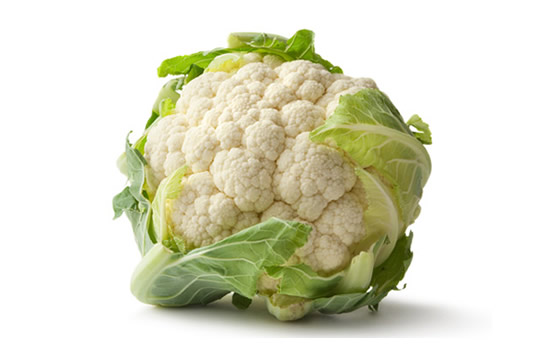Cauliflower is a cruciferous vegetable similar to broccoli and cabbage and is loaded with healthful vitamins and minerals.
Here are five of the health benefits related to cauliflower:
1 – Bone health
Eating cauliflower offers a rich source of vitamin C which is beneficial for producing collagen. This protein is needed to help protect the bones and joints from inflammatory damage. Plus, this vegetable is appreciated for containing vitamin K which is essential to promote strong bones for adults and slows the onset of osteoporosis.
2 – Digestive Support
A reliable intake of dietary fiber is able to benefit the digestive system and purging unnecessary substances from the body. A 1 cup serving of cauliflower (boiled) has about 3.27 grams of dietary fiber. Plus, the glucoraphin content in this vegetable is able to help protect the stomach lining. By minimizing the buildup of the bacterium helicobacter pylori it is possible to protect the stomach and avoid issues with stomach cancer or ulcers.
3 – Glucosinolates
Cauliflower contains sulfur-containing compounds known as Glucosinolates which cause the quite pungent-like flavor and smell. This helps to promote the body’s natural detoxification process. Glucosinolates is easily broken down by the chewing action. Plus, the chemical compound might benefit in preventing certain types of cancer. This vegetable is placed second in relation to Glucosinolates content, and just behind broccoli.
4 – Potassium
Potassium is vital to assist with a variety of normal body functions. This dietary mineral is beneficial for proper body hydration and regular heart beats. A reliable intake of potassium is in the region of 4700mg daily for adults. Eating cauliflower can provide a perfect source of low-calorie potassium. A 1 cup serving of cauliflower (raw and chopped) has about 27 calories and 320mg of this nutrient. This can be compared to a banana (medium size) which has about 105 calories and 423mg of potassium.
5 – Vitamin C
A regular intake of the antioxidant vitamin C is certain to help with brain and skin health. Reliable sources of vitamin C are oranges and similar fruit, but the cruciferous vegetable cauliflower is able to supply a good source of this essential nutrient. A 1 cup service of cauliflower has about 51mg of the nutrient, which compares to about 62mg for an orange. Daily guidelines for vitamin C are 75mg for women and 90mg for men.

Speak Your Mind